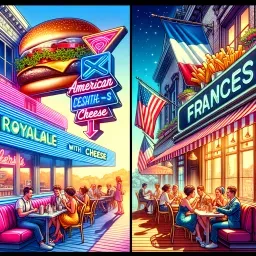Be cool, Honey Bunny

0
0
0
0
- Meaning
- The phrase ‘Be cool, Honey Bunny’ encapsulates a moment of tension and pressure while also conveying a sense of calm in the face of chaos. Philosophically, it reflects the human tendency to seek composure when surroundings become frantic. Psychologically, it suggests that maintaining a nonchalant attitude can be crucial in managing stress and conflict, and historically, it resonates with the 1990s culture of laid-back attitudes amidst serious situations.
- Allegory
- The image should include a central figure that symbolizes calmness and confidence, set against a chaotic backdrop representing stress and turmoil. The swirling storm clouds signify the challenges and tensions of life, while warm colors radiating from the figure symbolize their inner peace and strength. The light breaking through the clouds conveys the idea of clarity and hope, emphasizing that one can maintain composure even when faced with dramatic circumstances.
- Applicability
- This phrase can be applied to personal life by reminding individuals to stay calm during stressful situations. It encourages a composed demeanor when facing challenges, suggesting that crises can often be navigated with a level head rather than panic.
- Impact
- The impact of the phrase ‘Be cool, Honey Bunny’ extends beyond its immediate context; it has become a pop culture reference indicative of the cool, detached demeanor often celebrated in film and music of the '90s. It represents the kind of calm that many people aspire to maintain in high-pressure situations, often quoted in various contexts to encourage relaxed attitudes.
- Historical Context
- The phrase originated in the 1994 film Pulp Fiction, released during a time when independent films began to gain popularity and influence in Hollywood. This film, in particular, became a cultural landmark, symbolizing a new wave of cinematic storytelling that combined non-linear narratives with sharp dialogue.
- Criticisms
- There haven’t been major criticisms of the phrase itself, but some might argue that it promotes a somewhat casual approach to serious matters, possibly downplaying the importance of emotional responses in critical situations. A counterargument would assert that a cool demeanor can prevent hasty decisions and facilitate better problem-solving.
- Variations
- Variations exist across cultures, such as the Japanese concept of 'shikata ga nai' (it cannot be helped), which emphasizes acceptance and calm in the face of unavoidable situations. Similarly, the Brazilian idea of ‘relaxa’ carries a meaning of letting go and not stressing over challenges, highlighting cultural nuances in the interpretation of calmness.
-

You never fing mind, man. That’s your fing business.
-

I want you to go in that bag and find my wallet.
-

If you can’t say something nice, don’t say nothin’ at all.
-

I want you to use all your powers and all your skills. I don't want his mother to see him this way.
-

If my answers frighten you, then you should cease asking scary questions.
-

I just shot Marvin in the face.
-

Do you know what they call a Royale with Cheese?
-

Bring out the gimp.
-

Now, if you’ll excuse me, I’m going to go home and have a heart attack.
-

This is a tasty burger!
-

You know what they call a Quarter Pounder with Cheese in Paris?
No Comments